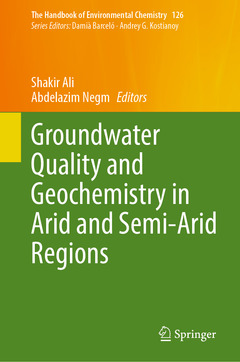Groundwater Quality and Geochemistry in Arid and Semi-Arid Regions, 1st ed. 2024 The Handbook of Environmental Chemistry Series, Vol. 126
Coordonnateurs : Ali Shakir, Negm Abdelazim

This book reviews groundwater quality and its major global contaminants, and collects the latest advances in the analysis, remediation, risk assessment, and hydrogeochemistry of groundwater in countries such as Algeria, Egypt, Ghana, Kazakhstan, Morocco, Saudi Arabia, and the USA. This book mainly focuses on the major arid and semi-arid areas where groundwater is scarce and highly polluted with geogenic and anthropogenic contaminants and the recharge to the groundwater is negligible due to limited rainfall.
Divided into 2 parts, the book starts by covering topics like assessment and protection of groundwater in arid and semi-arid regions, groundwater pollution, and contamination risk assessment. Particular attention is given to the application of environmental isotopes in groundwater studies and how anthropogenic activities impact groundwater quality, the impact of irrigation reservoirs in groundwater and soil quality, and how artificial intelligence is applied to forecast groundwater quality. In the second part of this book, readers will find more about the major global contaminants of groundwater in arid and semi-arid areas, including a geochemical analysis of fluoride and nitrate contamination.
Supported by regional case studies, this book appeals to researchers, scholars, and professionals working in the field of groundwater contamination and remediation and is also an important account for policymakers.
Shakir Ali is a hydrogeologist working in Jal Jeevan Mission sponsored by the Ministry of Jal Shakti, Govt. of India. He works on groundwater global contaminants, particularly fluoride, environmental isotopes, and groundwater modelling. He has 20+ research articles in international peer-reviewed journals, and 10+ years of research and teaching experience in the field of hydrogeology. He worked as an Assistant Professor at the Himachal Pradesh University, India.
Abdelazim Negm is a Professor of Hydraulics (and Water Resources management) at the Faculty of Engineering, Zagazig University (ZU), Egypt, since 2004. He was the Vice Dean of the Faculty of Engineering of ZU from 12/2008 to 12/2011 and was the Head of the Environmental Engineering Department at Egypt-Japan University of Science and Technology (E-JUST), Egypt, from October 2013 to March 2016. With 400+ papers in national and international journals and conferences, Prof. Negm has also contributed to 50+ book chapters and edited 35+ books, including some volumes in The Handbook of Environmental Chemistry book series from Springer. He was the editor-in-chief of EIJEST during the period of 2017–2020, an editor of the EMJEI, which is published by Springer, and an associate editor of the Journal of Remote Sensing and Space Sciences and Scientific African Journal, which is published by Elsevier. He is a guest editor MDPI and Frontiers leading several special issues. He was also the Head of the permanent scientific committee on Water Resources (committee no.115), the supreme council of Egyptian Universities, Egypt. Prof. Negm is listed in the most famous and prestigious directories in the world including the American Biographical Institute (ABI), Inc, USA, “Marquis Who's Who in the World,” 27th Ed., 2010, USA, until now and in IBC's 2000 as an Outstanding Intellectuals of the 21st Century by International Biographical Center, Cambridge, England, since 2011 until the present. He was nominated forDate de parution : 04-2024
Ouvrage de 369 p.
15.5x23.5 cm



